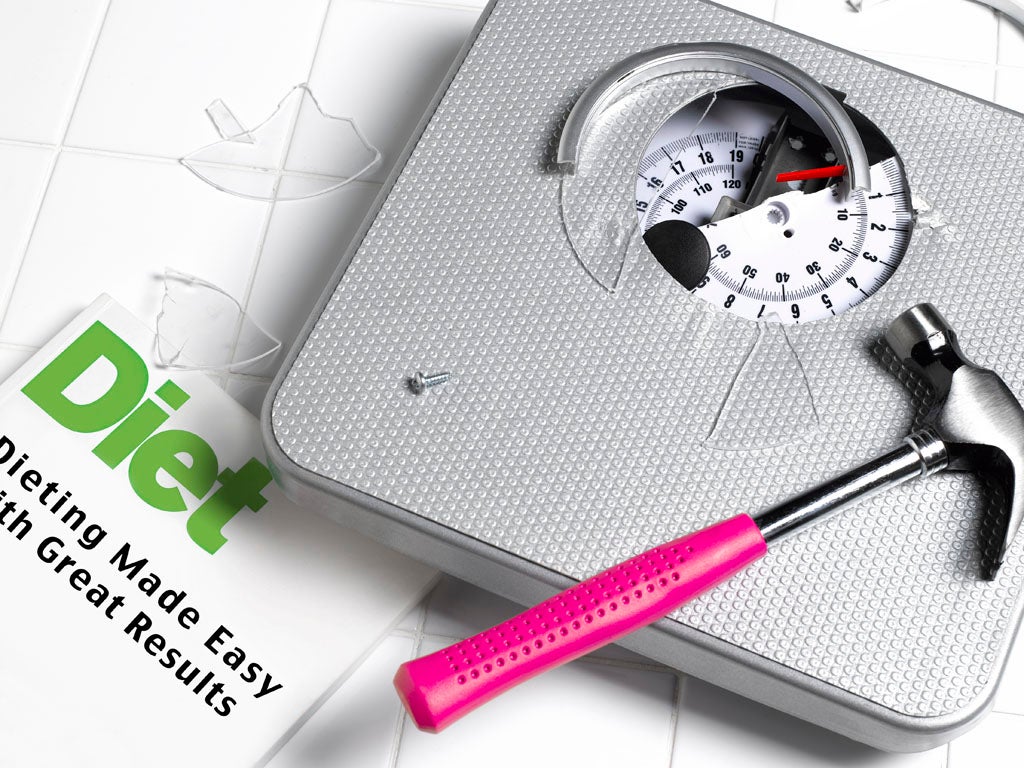5:2 is just the latest: Britain’s diet industry is worth £2 billion, so why do we buy into it?
Advertisers have us in thrall with their tantalising promises and scary understanding of exactly how to manipulate our insecurities


When I was a kid it was called roughage. Today they call it, rather less graphically cellulose or fibre. It’s that stuff in wholemeal bread, brown rice and pasta which keeps you “regular” as my grandmother would have put it with her usual euphemistic delicacy. It provides bulk in the gut and gives the muscular walls something to grip on as it squeezes the food through its length.
And let me tell you something. If you play stop/start havoc with your eating patterns, or try to cut out a whole group of foods such as carbohydrates you will be anything but regular. Your bowels will probably seize up and you will feel miserable and uncomfortable, not to mention other delights such as constipation-related bad breath and foul wind – from both ends. Trust me. I’ve been there, done that and got the crappy (or probably not in this context) T-shirt. We all need roughage for health. Deny it at your peril.
Everywhere I go people are talking about the 5:2 diet. Even restaurant chains are jumping on the bandwagon with ‘light salads suitable for fast days.’ Fancy going to a restaurant and paying money to eat hardly anything? Fools and their money meet emperors and their new clothes?
Michael Mosley started the 5:2 craze with a TV programme last summer and now inevitably there are lots of books. It involves a near fast for two days a week and stuffing yourself silly, if you feel like it, on the other five. Against my better judgement I tried it for four weeks last September. By the end of the month I was really quite ill because my guts no longer seemed to know what was expected of them – and complained in every way known to them. It was a relief, in every sense, to go back to eating normally.
The only way, I reckon, of making such an unnatural diet work – and it’s the same with the carbohydrate-free or very low carb Atkins and Dukan diets, both of which I’ve dabbled with, is to take laxatives every day. Well no doubt that makes the people behind the UK’s £20m laxative industry rub their hands with glee, but of course it is not good for anyone to fill themselves up with Senna or whatever on a daily basis.
Cue for a sober reminder that former ski champion Georgina Willson-Pemberton died last year from multiple organ disfunction caused by laxative abuse. The line between silly fad diets and eating disorders is a very narrow one sometimes.
And it isn’t just 5:2. Few of these extreme diets include much essential roughage. That ghastly cabbage soup plan doesn’t for example. Neither do those food substitute powders (read Lionel Shriver’s new novel Big Brother and shudder). And even if you simply go ‘carb free’ and eat nothing but lettuce and lean chicken, your body is unlikely to function properly.
So why do we do it? Britain’s diet industry – books, DVDs, magazines, subscription programmes, gym memberships, supplements, special foods and the rest – is worth £2 billion. For comparison that is only marginally less than the £2.33 billion which the NHS is spending on A&E services nationwide. It’s an obscene amount of money for people like you and me to be forking out just because the advertisers have us in thrall with their tantalising promises and scary understanding of exactly how to manipulate our insecurities.
Meanwhile we’ve forgotten how to eat properly.
For the record I’m not really overweight these days although I put it on easily and have been heavy in the past. For a long time now I have had a diet rather than going on one – although from time to time I stupidly get seduced by success stories and yearn to lose just a few pounds which is where I was last autumn. But nature didn’t intend me to be eight stone and I’ve learned that it’s wise to listen to the voice of common sense on these matters.
So want to try the Elkin diet? I’m feeling generous. You can have it free so that no one in the diet industry benefits. And it won’t take long.
The only sustainable way to stay healthy – and not be obese – is to keep as active as possible and eat regularly. Eat three meals a day: lots of fruit and vegetables, lean protein, high fibre carbohydrate foods in moderate quantities and go very easy on cakes, pies, biscuits, confectionery and alcohol. Not difficult or complicated. But it isn’t glamorous, celebrity-led, fashionable or likely to do much to sustain a £2 billion industry.
Did I mention activity? Follow a fad diet which prevents you eating regularly or sensibly and tiredness will get you. So then – duh! - you won’t feel like walking home from the station or taking the children swimming. If you’re overweight that simply compounds the problem and you remain trapped in the vicious circle which feeds the diet industry so handsomely. Exercise – which can be built into everyday life and costs nothing – is crucial to health (bowels again as well as other benefits) but very few extreme diet advocates make much of it because walking up stairs instead of taking the lift isn’t very sexy.
If you can keep your head when all about you are losing theirs you’ll be a man – or woman – and probably a thinnish one with regular habits too.
Join our commenting forum
Join thought-provoking conversations, follow other Independent readers and see their replies
Comments
Bookmark popover
Removed from bookmarks